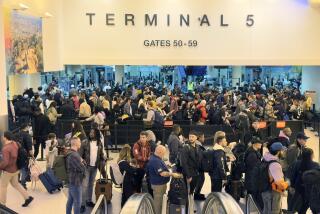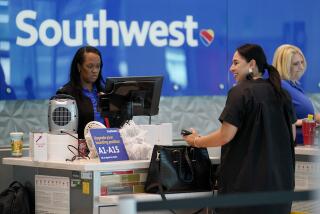TRAVEL INSIDER : As Days Grow Shorter, So Does Vacation Time : Innovation: The travel industry is trying to squeeze more hours into that fall classic, the weekend getaway, by offering time-saving, economical programs.
- Share via
Fall approaches, and a traveler’s thoughts turn to . . . the clock.
Fall, after all, is when school resumes, workloads weigh heavily and--especially in these days of tight money--weeklong vacation itineraries are compressed into weekend dashes. Between Sept. 1 and Nov. 30 last year, the U.S. Travel Data Center reported, American domestic travelers made 202.5 million weekend trips more than 100 miles from home.
And this year, like last year, the seasonal surge in weekend junkets is compounded by the trend toward shorter vacations year-round. Since 1990, noted Travel Data Center spokesman Joseph Horak, the average American vacation has shriveled from an already modest 4.1 nights to 3.9 nights.
“I see more people opting for shorter trips,” agreed Susan Boyce, an agent with Passport to Travel in Escalon, near Modesto. And educators and parents, she noted, aren’t the only ones on a particularly short tether this time of year. “People who work in retail can’t get away (for more than a long weekend). It’s their big selling time.”
When a traveler’s time is so short, every leisure hour begins to seem crucial, and consumers start looking closely at time-efficiency. Not surprisingly, a growing number of travel professionals are selling just that.
In the last two years, more and more hotels have been offering cut-rate weekend packages, often with the chance to save time as well as money. At the Hyatt Regency San Francisco, for instance, frequent guests who are members of the Hyatt Gold Passport program can often delay their Sunday checkout until as late as 5 p.m. Other guests can delay Sunday checkout to 2 p.m. at no extra cost, provided the room hasn’t been booked for that night.
Officials at Hilton and Conrad hotels on Aug. 21 announced a “Zip In Check-In” program that theoretically makes it possible for frequent guests to check in within 30 seconds. Under the program, open to Hilton’s 2 million HHonors Members, reservationists get a guest’s preferences on the phone so that on arrival day, the guest can present a credit card, grab a room key and head for the elevator. The service will probably be offered to all guests in the next three months.
“The policy is, ‘No waiting,’ ” said Hilton public relations coordinator James E. Boyd II. “If you’re on vacation, checking into the Hilton Hawaiian Village, and you’ve got three kids going in 14 directions, and you can turn a 5-10-minute process into one that lasts 30 seconds, it would certainly be a nice start.”
The Hilton at Chicago’s O’Hare International Airport has teamed with American Airlines to offer another time-saving possibility. Since its reopening last month after renovations, that Hilton has been offering guests the option of checking luggage directly from the hotel lobby to American flights. Conversely, arriving American passengers can leave their baggage check number at the airline’s counter and the bags will be forwarded to the hotel.
In these strategies, the hotels have plenty of company. Roger Ballou, president of American Express’ Travel and Travel Services Group in New York, said the firm’s consumer studies a year ago pinpointed a rising “combination of price- and time-consciousness . . . People were buying down in terms of price and duration.”
In response, American Express stepped up the Express Weekends program it began in 1990. Under the program, card holders pay an extra $75 yearly for a chance at deeply discounted flights and hotel rooms, usually arranged in long-weekend packages. By late last year, the program had grown to include Los Angeles and six other major cities.
Now, however, the program could become a victim of the consumer demand that first fed its success. American Express officials say that airlines and hotels are now offering such deeply discounted weekend packages directly to the public that Express Weekends offerings are no longer such an exclusive bargain. The program, officials said, may be phased out later this year.
But plenty of other time-saving programs remain in all areas of the travel industry. Though some are aimed at tourists with more ambitious itineraries, many of these programs might make a weekend traveler’s life easier. And new ones seem to be surfacing daily. A sampling:
* Royal Caribbean Cruise Line, which started offering three- and four-night cruises in the middle of last year, is now pitching special fares on those packages from Oct. 9 to Dec. 14. For a three-night weekend cruise on the Viking Serenade from Los Angeles to Catalina, Ensenada and back, Royal Caribbean’s prices for some dates reach as low as $325 for early bookings of inside cabins. Those who can take time off midweek in October or November can get an even deeper discount: four days in San Diego, Ensenada and Catalina for as little as $345 for a cabin without a view, booked well in advance.
“It’s very clear to us that people want three- and four-day cruises,” said Lloyd Axelrod, director of public relations for the Miami-based cruise line. “The two ships we have that were built especially for that are running pretty much full all the time.”
* Alaska Airlines is promoting two-night mini-vacations to Mexico that include air fare and hotel costs. The lowest prices--as little as $284 per person, double occupancy, including taxes, for a Puerto Vallarta getaway--are for weekday travel. For the same trip on a weekend, the price is about $330 per person, based on round-trip air fare from LAX, transportation between airport and hotel, and two nights in a double room at the Playa Los Arcos Hotel. All fares are subject to seat availability, and tickets must be bought at least five days before travel and used before Dec. 14.
* My favorite idea among all these time- and trouble-saving offers, however, comes not from the airline or hotel or cruise industries, but from the trailer rental business.
High Sierra Trailer Rentals of June Lake is located in the Inyo National Forest, 20 miles north of Mammoth Mountain and 70 miles southeast of Yosemite. Make a reservation, drive your car up to one of the many Forest Service campsites in the area, call the trailer rental company, and its employees pledge that they’ll soon roll up with your trailer.
They park and level the trailer, light the appliances and explain how things work, then leave you to your dinner and ghost stories. When you go home, you leave the trailer behind.
“All they’ve got to do is walk in, put food in the fridge and put their beds together,” said High Sierra manager Diana Bennett. The service carries a three-night minimum and offers trailers sleeping four to seven people, depending on the model, usually costing $138-$195 total for three nights, excluding campsite. The fanciest camper includes a stereo, microwave oven and air conditioning. My kind of camping.
Evidently, I’m not alone. Bennett said the company has been renting trailers for about 30 years, and last year increased its fleet from 35 to 40. At least two other firms--Sierra Vacation Trailer Rentals in Crowley Lake, Calif., and Hank & Ray’s Vacation Trailer Rentals in Bridgeport--provide similar service in neighboring areas.
Anyway, the list of time-sensitive travel offers goes on and on: a one-night Ensenada cruise/San Diego hotel package for $99; a three-day air/hotel package in Cabo San Lucas beginning at about $300; a weekend Catalina cruise/hotel package starting at $177. Some look like great getaways, others seem suspiciously brief and cheap. As always, travelers should look carefully before leaping, cruising or flying. As Lloyd Axelrod of Royal Caribbean Cruise Line noted, “You can only cut so many steps out of a process before you begin to lose quality.”
More to Read
Sign up for The Wild
We’ll help you find the best places to hike, bike and run, as well as the perfect silent spots for meditation and yoga.
You may occasionally receive promotional content from the Los Angeles Times.







